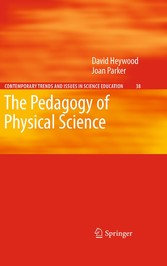Suchen und Finden

The Pedagogy of Physical Science
In the science classroom, there are some ideas that are as difficult for young students to grasp as they are for teachers to explain. Forces, electricity, light, and basic astronomy are all examples of conceptual domains that come into this category. How should a teacher teach them? The authors of this monograph reject the traditional separation of subject and pedagogic knowledge. They believe that to develop effective teaching for meaningful learning in science, we must identify how teachers themselves interpret difficult ideas in science and, in particular, what supports their own learning in coming to a professional understanding of how to teach science concepts to young children. To do so, they analyzed trainee and practising teachers' responses to engaging with difficult ideas when learning science in higher education settings.
The text demonstrates how professional insight emerges as teachers identify the elements that supported their understanding during their own learning. In this paradigm, professional awareness derives from the practitioner interrogating their own learning and identifying implications for their teaching of science. The book draws on a significant body of critically analysed empirical evidence collated and documented over a five-year period involving large numbers of trainee and practising teachers. It concludes that it is essential to 'problematize' subject knowledge, both for learner and teacher.
The book's theoretical perspective draws on the field of cognitive psychology in learning. In particular, the role of metacognition and cognitive conflict in learning are examined and subsequently applied in a range of contexts. The work offers a unique and refreshing approach in addressing the important professional dimension of supporting teacher understanding of pedagogy and critically examines assumptions in contemporary debates about constructivism in science education.
Alle Preise verstehen sich inklusive der gesetzlichen MwSt.


















